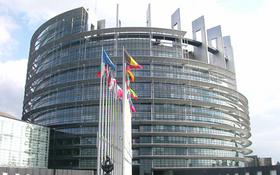Flexibility clause

- The seat of the European Parliament in Strasbourg (Photo: Quedza)
The EU can only make decisions if there is a specific legal basis for doing so in the treaties. This is called the principle of conferred powers. However, the TEC contains a so-called flexibility clause, which has been used to extend the area for EU regulation.
Within the aims of the treaties, Art. 308 TEC allows the EU to govern in an area where no legal powers are available under other articles.
It was used particularly in the 1970s and 1980s to increase the competence of the EU before the adoption of the Single European Act (SEA) in 1987, which introduced more specific articles and chapters empowering the EU to legislate in areas such as environment, research, development and regional policy.
The future
The Convention on the Future of Europe will keep and extend the flexibility clause to allow flexible adjustments of EU competence within the policies of the Union.
The existing flexibility clause can only be used in connection with the common market. The new clause will be used in all areas of the European Union.
Links
See EU Constitution Art. I-17.
